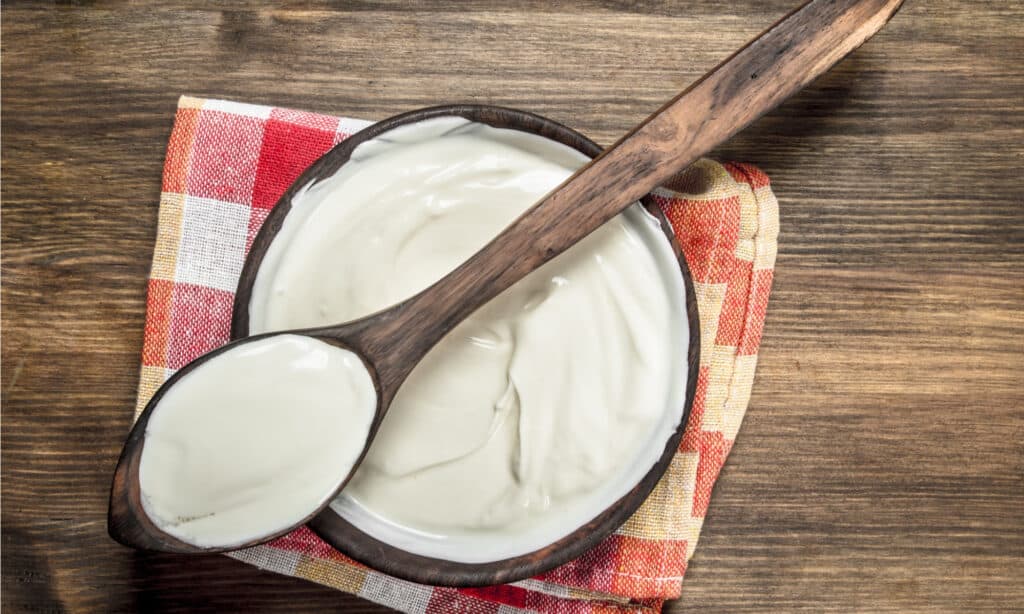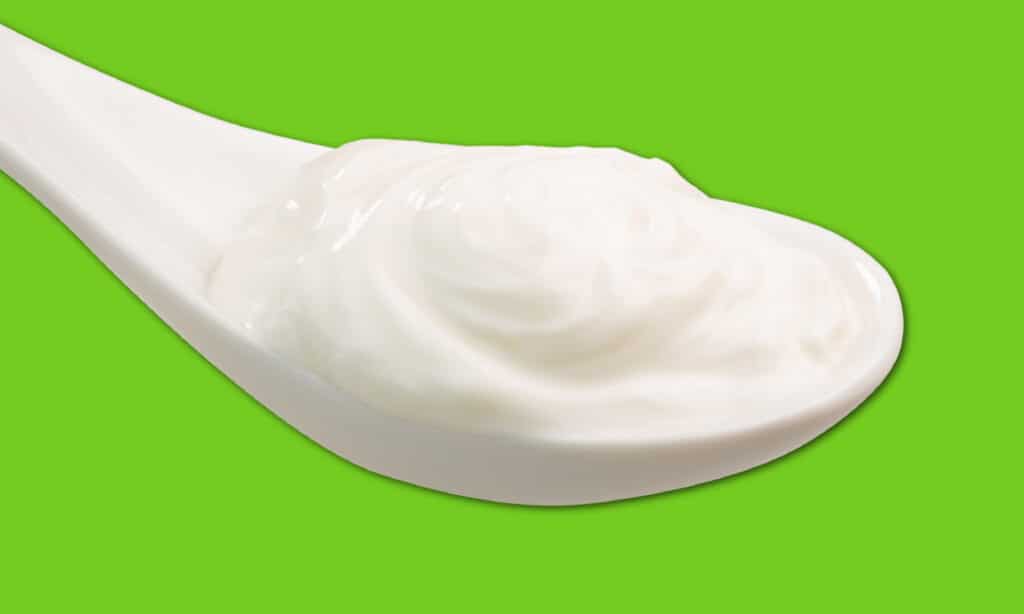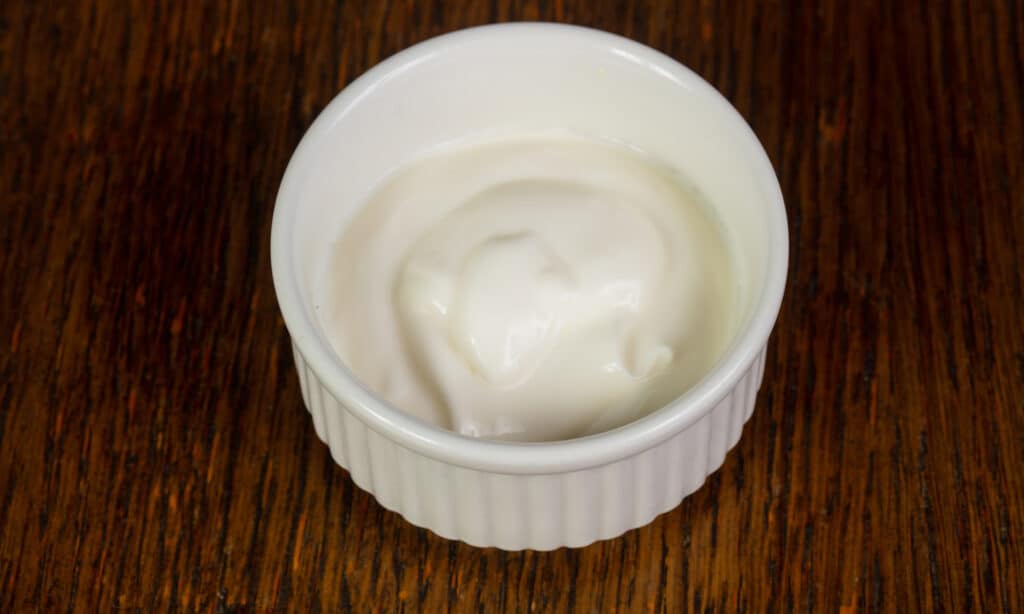As dog owners, we want to ensure that our furry friends are happy, healthy, and well-fed. That’s why it’s important to know what human foods are safe for dogs to eat. While some human foods can be nutritious and tasty treats for our pets, others can be dangerous and even fatal. In this article, we’ll take a closer look at the question of whether or not dogs can eat sour cream. We’ll examine the nutritional value of sour cream for dogs, any potential health risks associated with feeding sour cream to dogs, and explore some alternatives to sour cream.

The Sour Cream Question: Can Dogs Eat It?
If you’re a fan of Mexican cuisine or baked potatoes, you may have wondered whether or not it’s okay to give your dog a taste of sour cream. The good news is that yes -dogs can eat sour cream safely when given in moderation. Sour cream is a dairy product made by fermenting cream with lactic acid bacteria.
It’s high in fat and calories, but it also contains vitamins and minerals that can be beneficial for dogs. That being said, it’s important to feed sour cream to your dog in moderation.
Too much fat in their diet can lead to obesity and other health issues. It’s also worth noting that some dogs may be allergic or intolerant to dairy products, so you should always introduce new foods gradually and keep an eye out for any adverse reactions.
Can Dogs Eat Sour Cream?
Sour cream is a popular dairy product used in many recipes, including dips, dressings, and sauces. It’s creamy and tangy taste can make any dish more flavorful.
But can dogs eat sour cream? The answer is yes, dogs can eat sour cream in moderation.
Sour cream is not toxic to dogs and does not pose any immediate danger to them. However, it’s important to note that just because food is safe for humans doesn’t necessarily mean it’s safe for our furry friends.
Sour cream contains low levels of lactose, making it easier for dogs to digest compared to other dairy products like milk or cheese. However, some dogs may still be intolerant or allergic to lactose.
It’s also worth noting that while sour cream is generally safe for dogs to consume in small quantities as an occasional treat or addition to their regular diet, too much can lead to health problems such as obesity and pancreatitis. As with any new food introduced into a dog’s diet, it’s essential to start with small amounts and pay attention to how your dog reacts before deciding whether or not they should continue eating sour cream.

Why Sour Cream Is Safe For Dogs
Sour cream has several benefits that make it a safe option for dogs when fed in moderation. It contains protein and calcium which are essential nutrients needed by our canine companions.
Furthermore, the low levels of lactose make sour cream easier on a dog’s digestive system compared to other dairy products like milk or cheese. This makes it an excellent alternative if you’re looking for something creamy but less likely to cause digestive issues in your furry friend.
Additionally, some pet owners use plain Greek yogurt as an alternative source of probiotics instead of expensive supplements — choosing plain Greek yogurt over sour cream does offer great benefits. Of course, it still depends on how your dog tolerates these foods.
If you notice any digestive issues, it’s best to speak with your veterinarian as they may recommend an alternative. Sour cream is safe for dogs to consume in moderation.
It’s important to remember that each dog is different and may react differently to new foods introduced into their diet, so always start with small amounts and observe your furry friend closely for any adverse reactions. If you’re unsure about feeding your dog sour cream or any human food in general, it’s always best to consult with a veterinarian first.
Benefits of Feeding Sour Cream to Dogs
Provides a Source of Calcium and Protein
Calcium and protein are essential nutrients for dogs. Calcium helps in the development of strong bones, teeth, and muscles, while protein is important for building and repairing tissues. Sour cream is an excellent source of both calcium and protein.
Just a small amount of sour cream can provide a good dose of these nutrients to your furry friend. Dogs that do not get enough calcium in their diet can suffer from weak bones, which can lead to fractures or breaks.
Similarly, insufficient protein intake can cause muscle wasting or weakness. By feeding your dog sour cream in moderation, you can help ensure that they are getting adequate amounts of these vital nutrients.
Helps with Digestion and Gut Health
Sour cream contains probiotics, which are beneficial bacteria that live in the gut and help maintain a healthy digestive system. These probiotics aid in digestion by breaking down food more efficiently and helping the body absorb essential nutrients.
Probiotics also play a role in keeping the gut healthy by preventing harmful bacteria from overgrowing. This is particularly important for dogs who may have sensitive stomachs or be prone to gastrointestinal issues such as diarrhea or constipation.

Can Be a Tasty Treat for Dogs
Dogs love treats! And sour cream can be a tasty addition to their diet when given in moderation. A dollop of sour cream on top of their food or as an occasional snack can make mealtime more enjoyable for your furry friend.
It’s important to remember that while dogs may enjoy human foods like sour cream, they should not be given too much at once or too often. Overindulging in high-fat foods like sour cream can lead to weight gain and other health problems such as pancreatitis.
Serving Suggestions
When feeding your dog sour cream, it’s important to keep serving sizes small and infrequent. A tablespoon or two of sour cream per day is plenty for most dogs. Consider using sour cream as a topping for their food or mixing it in with other dog-friendly human foods like cooked chicken or vegetables.
If your dog has a sensitivity to dairy products, it’s best to avoid feeding them sour cream altogether. Always consult with your veterinarian before introducing any new foods into your dog’s diet.
Risks and Precautions
Dairy allergies in some dogs
While sour cream is generally safe for dogs, it’s important to note that some dogs can have dairy allergies. This means that feeding them sour cream could lead to digestive issues such as vomiting and diarrhea.
Symptoms of a dairy allergy typically occur within a few hours after consumption, so it’s important to monitor your dog closely if you decide to feed them sour cream for the first time. If you suspect your dog may have a dairy allergy, it’s best to avoid feeding them sour cream altogether.
Instead, opt for alternative treats that are less likely to trigger an allergic reaction. Consult with your veterinarian if you’re unsure whether or not your dog has a dairy allergy.

High-fat content can lead to obesity and pancreatitis
Another risk associated with feeding dogs sour cream is its high-fat content. Too much fat in a dog’s diet can lead to obesity and even pancreatitis, which is a serious condition that can be life-threatening if left untreated.
It’s important to keep in mind that while small amounts of sour cream may be safe for dogs, they should only be fed in moderation. If you choose to give your dog sour cream as an occasional treat or topping, make sure not to overdo it and always monitor their weight and overall health.
Importance of feeding sour cream in moderation
Feeding any human food items in excess can be harmful to dogs, including sour cream. As previously mentioned, high fat content puts dogs at risk of developing obesity and pancreatitis if they consume too much of it regularly.
In addition, sour cream contains lactose which may cause digestive issues such as gas or bloating if given excessively. It’s paramount for pet owners not make the mistake of overfeeding their furry friends because they are showing excitement about new food.
Therefore, while sour cream can be a tasty treat for your dog, it’s important to feed it in moderation and not make it a regular part of their diet. Consult with a veterinarian before adding any new human food items to your dog’s diet.
Alternatives
If you’re looking for a healthier alternative to sour cream for your dog, plain Greek yogurt is a good option. It contains less fat and lactose than sour cream but still provides similar nutritional benefits such as protein and calcium.
Other dog-friendly human foods that can be used as toppings or treats include cooked meats such as chicken or turkey, fruits like blueberries or bananas, and vegetables like carrots or green beans. Just make sure to research any new foods before feeding them to your dog and always introduce them gradually to avoid digestive upset.

Alternatives to Sour Cream
Plain Greek Yogurt as a Healthier Alternative
Sour cream is not the only dairy product that can be safely given to dogs. Plain Greek yogurt is a healthier alternative that has even more benefits for your furry friend.
This type of yogurt is rich in protein and probiotics, which can help improve your dog’s digestion and overall gut health. Plus, it has lower fat content than sour cream, making it less likely to cause weight gain or pancreatitis.
When choosing Greek yogurt for your dog, make sure to select one that does not contain added sugars or artificial sweeteners. These can be harmful to dogs and may cause digestive issues or other health problems.
One way to incorporate Greek yogurt into your dog’s diet is by using it as a topping for their food. Mix a spoonful of plain Greek yogurt with their dry kibble or wet food for a tasty and nutritious addition to mealtime.
Other Dog-Friendly Human Foods That Can Be Used as Toppings or Treats
In addition to sour cream and Greek yogurt, there are many other types of human foods that can be safely given to dogs in moderation. Here are some ideas:
- Cooked lean meats such as chicken, turkey, or beef –
- Fruits like apples, bananas, and strawberries (avoid grapes and raisins)
- Vegetables such as carrots, green beans, and sweet potatoes
- Small amounts of cheese (cheddar or cottage cheese)
These foods should always be introduced gradually into your dog’s diet and given in moderation. It’s also important to avoid feeding them any foods that are toxic for dogs such as chocolate, onions, garlic, or avocados.
When using these human foods as toppings or treats for your pooch remember moderation is key! Too much of anything – even healthy items – can lead to health issues such as weight gain and gastrointestinal issues.

Conclusion
After exploring whether dogs can eat sour cream, it is clear that a small amount of sour cream is safe for most dogs. Sour cream can even provide some nutritional benefits, including calcium and protein.
However, it’s important to remember that feeding human foods to dogs should always be done in moderation and after consulting with a veterinarian. It’s also essential to keep in mind the potential risks associated with feeding sour cream or any other human food to your dog.
Some dogs may have dairy allergies or be unable to handle the high-fat content in sour cream, which could lead to obesity and pancreatitis. Therefore, when giving your dog any human food as an occasional treat or topping on their regular diet, it’s important to start with small portions and monitor their reactions closely.
If you notice any adverse effects, stop immediately and contact your vet. In addition to sour cream, there are many other dog-friendly human foods that can be used as toppings or treats for your furry friend.
Plain Greek yogurt is a healthier alternative that still provides similar nutritional benefits as sour cream without the added fat. Overall, feeding your dog human foods can add variety and enjoyment to their diet while providing them with some additional nutrients.
Just remember always to do so in moderation and after considering the potential health risks. By doing so, you can keep your dog happy and healthy for years to come!
~Lindsie
